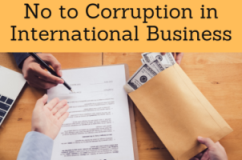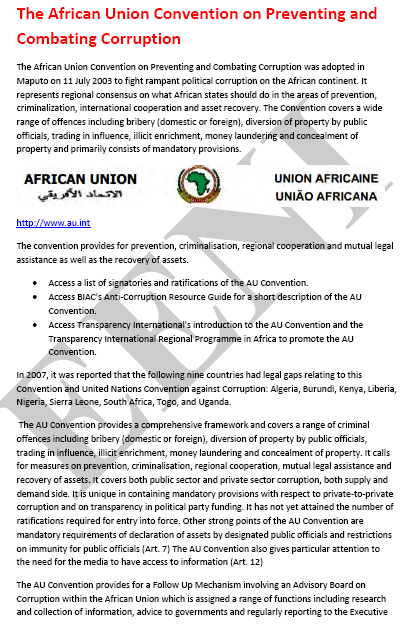African Union Convention Combating Corruption
Advisory Board on Corruption (African Union) Nigeria
The topics covered by the African Union Convention on Preventing and Combating Corruption are bribery, trade influence, criminalization, immunity for public officials, money laundering, asset recovery, property rights, public tenders, foreign enterprises, unfair competition, and witness protection.
The Convention on Preventing and Combating Corruption covers public and private sector, and supply and demand side of business.

- Introduction to the African Union Advisory Board on Corruption
- Regional Anti-Corruption Programme for Africa
- African Union Convention on Preventing and Combating Corruption
Sample - African Union Convention on Preventing and Combating Corruption



The Subject “African Union Convention on Preventing and Combating Corruption” is included within the curriculum of the following academic programs at EENI Global Business School:
Modules: No to Corruption in International Business, Institutions are Leading African Transformation.
Doctorate in African Business.

Master in Business in Africa, Transport and Logistics in Africa.

Languages:  or
or  Convention contre la corruption (UA)
Convention contre la corruption (UA)  Convenção contra a corrupção (UA)
Convenção contra a corrupção (UA)  Unión Africana.
Unión Africana.
The African Union Convention on Preventing and Combating Corruption entry into force in 2006.
Thirty-four African Countries are members of the Convention on Preventing and Combating Corruption: Algeria, Benin, Burkina Faso, Burundi, Comoros, Congo, Ivory Coast, Ethiopia, Gabon, Gambia, Ghana, Guinea-Bissau, Guinea, Kenya, Libya, Lesotho, Liberia, Madagascar, Mali, Malawi, Mozambique, Namibia, Nigeria, Niger, Rwanda, Senegal, Seychelles, Sierra Leone, South Africa, Tanzania, Togo, Uganda, Zambia, Zimbabwe.
The countries that have not signed the Convention on Preventing and Combating Corruption are Angola, Botswana, Cameroon, Cape Verde, Central African Republic, Chad, Democratic Republic of the Congo, Djibouti, Egypt, Eritrea, Eswatini, Equatorial Guinea, Mauritania, Mauritius, Sahrawi Arab Democratic Republic, São Tomé, Somalia, Sudan, South Sudan, Tunisia.

The obligations of the Convention on Preventing and Combating Corruption are:
- Preventive measures (asset declaration, codes of conduct, access to information, standard accounting, and independence of authorities)
- Criminalization (illicit enrichment)
The Convention on Preventing and Combating Corruption does not include provision on sanctions

(c) EENI Global Business School (1995-2025)
Top of this page







 WhatsApp
WhatsApp